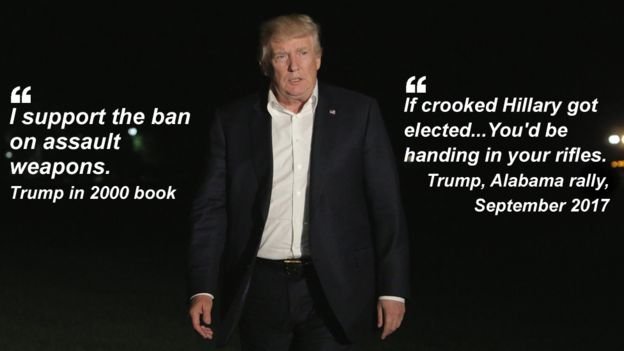
When attempting to interpret Donald Trump's statements on firearm regulation, and how they could shape a presidential policy response to the Las Vegas mass shooting, the key is to note when he said them.
As with many of his political opinions, Mr Trump's views on gun control have shifted to the right over the years.
In the 1990s and early 2000s, Mr Trump expressed support for a ban on so-called assault weapons - long rifles with military-style features to more easily fire multiple rounds.
"I generally oppose gun control, but I support the ban on assault weapons and I support a slightly longer waiting period to purchase a gun," he wrote in his 2000 book, The America We Deserve.
In 2012 Mr Trump praised Democrat Barack Obama's call for more firearm regulation after the shooting at a Newtown, Connecticut, school that claimed 26 lives, including 20 children.
Conservative bona fides
As Mr Trump began more seriously contemplating a bid for the Republican presidential nomination, however, his views on gun control changed. By the time he announced his entry into the race in 2015, he was well within the mainstream of the Republican Party, which viewed most forms of additional gun regulation as a violation of Second Amendment constitutional protections.
It was Mr Trump's way of establishing his conservative cultural bona fides - proving that he wasn't the big-city liberal he had at times seemed.
In an October 2015 Republican debate, for instance, he boasted that he carried handguns "a lot" and said government-mandated gun-free zones in places like schools, churches and military bases were a "catastrophe" and made for "target practice for the sickos".
Mr Trump would frequently say the answer to mass shootings was having more citizens with firearms - contending that the death toll in the Paris and San Bernardino attacks would have been much lower if bullets had been going "both ways" - towards the victims and the assailants.
To the surprise of many, Mr Trump secured the endorsement of the National Rifle Association in May 2016, at a time when some Republicans were still uncomfortable with the New Yorker as their presumptive nominee.
"Now is the time to unite," NRA Executive Director Chris Cox said at the time. "If your preferred candidate got out of the race, it's time to get over it."
From then on Mr Trump - in his statements and on his campaign website - largely echoed the NRA's hard line on firearm issues. The group would end up spending more than $30m (£22m) to support Mr Trump's presidential bid.
During the general election, Mr Trump attacked Democrat Hillary Clinton as being in favour of stringent gun control and pledged that he was the candidate that would protect the rights of the estimated 55 million Americans who currently own firearms.
There was one moment during last year's campaign, however, when Mr Trump did break with the NRA's line. After the Orlando nightclub shooting in June, he appeared to endorse limiting gun purchase for national security purposes.
"I will be meeting with the NRA, who has endorsed me, about not allowing people on the terrorist watch list, or the no fly list, to buy guns," he tweeted.
Nothing came of that meeting, however, and as president Mr Trump appears to have made little effort to follow through on it.
A time to heal
In the meantime, Mr Trump now has the unenviable task of trying to heal the nation after yet another "deadliest mass shooting in modern US history" and explaining what - if anything - he proposes to do to stop future tragedies.
George W Bush's turn came in April 2007, as a shocked nation mourned 32 dead on a Virginia college campus.
Barack Obama had his moment in June 2016, following the Orlando Pulse nightclub attack that left 49 dead.
"This massacre is … a further reminder of how easy it is for someone to get their hands on a weapon that lets them shoot people in a school, or in a house of worship, or a movie theatre, or in a nightclub," he said after Orlando.
"And we have to decide if that's the kind of country we want to be. And to actively do nothing is a decision as well."
Hi! I am a robot. I just upvoted you! I found similar content that readers might be interested in:
http://www.bbc.co.uk/news/world-us-canada-41478293